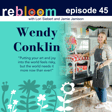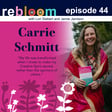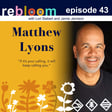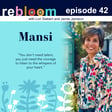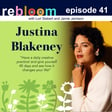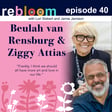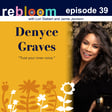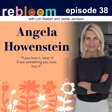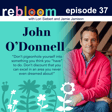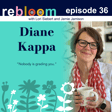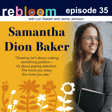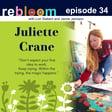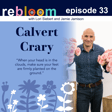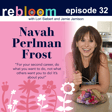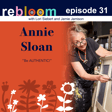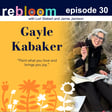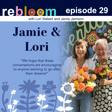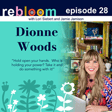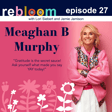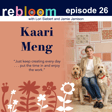Introduction to Joyful and Authentic Living
00:00:01
Speaker
Do you have a dream that is a small seed of an idea and it's ready to sprout? Or are you in the workplace, weeds, and you need to bloom in a new creative way? Perhaps you're ready to embrace and grow a more vibrant, joyful, and authentic life. If you answered yes to any of these, you are ready to re-bloom.
00:00:24
Speaker
Welcome to the podcast where we have enlightening chats with nature lovers, makers, and artisans as they share inspiring stories about pivoting to a heart-centered passion. Hello, I'm Lori Siebert, and I am very curious to hear from friends and artisans about the creativity that blooms when you follow your heart. And I'm Jamie Jamison, and I want to dig deep into the why behind each courageous leap of faith and walk through new heart-centered gardens.
00:00:54
Speaker
Each episode of Rebloom will be an in-depth conversation with guests who through self-discovery shifted to share their passions with the world. Get ready to find your creative joy as we plant the seeds for you to Rebloom.
Meet Seth Apter: From Psychology to Mixed Media Art
00:01:11
Speaker
Hey, everyone, we are back for a totally cool and exciting episode of Rebloom. I'm Jamie Jamison. And I'm Lori Seibert. And today we are welcoming Seth Apter, who started his career as a psychologist and has rebloomed to a mixed media artist. So we are so excited today to welcome Seth. Welcome, Seth. Hey, Jamie, thank you so much.
00:01:39
Speaker
So I get the pleasure of introducing Mr. Seth Apter, who I am fascinated by, and I did a deep dive into your website. Oh my gosh, Seth, you have done so much stuff.
00:01:56
Speaker
It's amazing so you're a mixed media artist, you're an author, you teach, you just were teaching in Australia which that's pretty cool when I hear life goals. So we really just want to kind of have you tell more of your story but I definitely want you to share
00:02:16
Speaker
the story about the communication you had through mail that I love that story. So please share that one. But let's just have you start out telling a little bit where you started. And we love hearing about pivot points because that's the theme of this podcast is reblooming. So take it away, Seth.
00:02:38
Speaker
Well, thank you, Laurie, so much. First of all, I'm just so appreciative that you invited me here and always happy to share my story. So I am currently an artist, but as you noted in the intro, I did not start out that way. And my original career was as a psychologist.
00:02:58
Speaker
And I think interestingly, in my mind, compared to a lot of people, I was never a person when I was younger who always wanted to be an artist. I often hear the story about parents moving people in a different direction because it's not viable as a career or instructors telling somebody in the first grade, no, you'll never be an artist and that person stops dreaming. For me, it was never really my dream. It ended up being a pivot.
00:03:28
Speaker
a life pivot from a very serendipitous moment in time that really just changed everything.
00:03:36
Speaker
So I could tell you a little bit about that. Yeah, we'd love to hear that.
Life-Changing Gallery Visit and Mail Art Exchange
00:03:42
Speaker
I love it. I'm a person who believes that if you keep your eyes open, you will see things, whether it's you want to call it signs, whether you want to call it opportunity. But I just think that that's something that I've always had going for me, which is I think helped me a lot. So I was
00:04:04
Speaker
working as a psychologist, which we can certainly talk more about as well after, and not dreaming about being an artist. And in fact, as a young adult, I really did nothing in art. I was a creative person, but not in visual arts at all. And I think really
00:04:24
Speaker
The thing I remember doing was being in grade school and being forced to make art projects. And after that, it just disappeared. And I always did love art, though, because I lived in New York City and was just really exposed here to the galleries and the museums and just all the creativity that is floating in the air in New York City all the time. So I was an art lover, but not an art maker.
00:04:47
Speaker
I was traveling in the Pacific Northwest, which had been a dream of mine, and I started in Portland, ended up in Seattle, and then went to Vancouver, Canada.
00:04:58
Speaker
And this was in the year 2000, just to give you a timeframe. And I was definitely an adult then. And I was wandering around and saw a gallery that I found so intriguing. There was just something about it that was pulling me in. Looked like it could have been in Soho, which at that time was where the galleries were in New York.
00:05:20
Speaker
And I was just mesmerized by it. And it was as if a magnet I was just drawn in the front door. And I loved the work that I saw. It was a little bit unfamiliar to me. It was a little different. It was very abstract, but it was very textual. I did not know it at the time, but it was encaustic and cement and plaster and just
00:05:40
Speaker
really beautiful and ethereal and just very, very powerful to me. So I looked around and asked the woman who was working at the desk if she could tell me a little bit about the artist. She introduced herself. Her name was Patricia Larson. And she turns out she was the artist as well as the gallery owner.
00:05:58
Speaker
And she and I kind of hit it off, and I just spent a few hours there talking to her, listening to her, asking her about the art, and ended up buying a few small pieces that I planned to take home, which to me was going to be the end of the story, but really was just the beginning.
00:06:17
Speaker
So I went back home to New York, brought my pieces, hung them where they belonged. This may sound strange to some people, but put them in my bathroom where they remain to this day five years later, because I think that's really an important place for art. And I just went back to my business and going back to work. And about two weeks after I came home, I received a
00:06:42
Speaker
postcard in the mail from Patricia thanking me for buying the work and asking me how I liked living with it. And I was completely taken aback by it. It was a handmade postcard. And first of all, I just loved what it was physically and looked to me like, oh, I would have bought this piece. And then I was so touched that she thought of me
00:07:04
Speaker
And this was an artist, me not being an artist. I didn't know that artists were just people. So this was like, oh my God, this artist who owns a gallery was mailing me art. So I wanted to thank her and I felt like I had to thank her in kind. So I decided I was going to make a postcard. And it was really the first thing I made for decades. And I basically kind of copied her.
00:07:29
Speaker
And because I didn't, what did I know? And I mailed it back to her. Again, thought that was the end of the story until about a week or two later, I got something else in the mail from her. And it was, I remember it so clearly, it was a small book page drawn out of a book that had paint on it. And I was just totally mesmerized by the gift of it, the generosity, the thoughtfulness and the beauty of it. And then I'm like, uh-oh, like, what do I mail back now?
00:07:57
Speaker
So I went and not knowing it was actually acrylic, because what did I know? I went and got it a little cheap kids watercolor set and pulled out a page from a book and splattered paint on it and mailed it back to her. And of course, you know what happened next. It happened again and again and again. And we ended up in what I didn't know then, but of course now is a male art relationship. She was in Vancouver in Canada. I was in New York City. And this went on.
00:08:26
Speaker
I kid you not, for probably about four or five years. I had stacks of things she sent and they just got better and better and better. Little mini books, altered photographs, just things that she put on the outside of the envelope, just really wonderful, fascinating, incredible things. Every time she sent it, I got more connected with her and I sent something back.
The Impact of Personal Connections on Artistic Path
00:08:53
Speaker
And I did not know it, but she became my muse, my instructor, my guide, my sherpa, and really somebody who in literally a moment completely changed my life. And talk about a pivot, it really redirected me. Wow, yeah.
00:09:11
Speaker
Isn't that amazing? I love this story so much. It's the coolest. It's really an incredible story. Like sometimes I, I mean, I know it happened, but it's, it's just almost unbelievable to me that this happened.
00:09:25
Speaker
Did you, I have a question, did you save all of those? And did she save all of those? And can you put them all together in a book? Because, oh my God, I want to read this book. I mean, we both saved. We both had stacks. And we both talked about over the years, maybe even doing an
00:09:42
Speaker
an exhibition or an exhibit somewhere to share it. It's all very personal, but I feel like it's so inspiring and motivating that I think it's worth publicly sharing. Every once in a while on a live video, I'll just run to the drawer and just bring out the stack
00:10:05
Speaker
Wow, some of the stack. It's always wonderful to look back at these materials as well. I don't do it that often, but when I do, it's just like going back in time and sort of seeing where I was before and seeing where I am now.
00:10:21
Speaker
Yeah. The other thing I love about this so much because we're in an age of everybody communicating by text and email is the snail mail. Yes, tactical. I love it so much. I listened to Julia Louise Dreyfus' podcast, Wiser Than Me. She had Isabel Alande and she talked about how she and her mother corresponded almost daily.
00:10:51
Speaker
And she has like, I don't know how many letters just like daily recording their lives. And I just I love that so much. And there's so much history and legacy in what those treasures that you have. Well, it's a bit of a lost art, I think. But anybody who is.
00:11:13
Speaker
an artist in the vein that I am, mixed media, and who loves ephemera and old things with history, knows the excitement that you feel when, let's say you're at a flea market and you're digging through what mostly is crap, to be honest. You find that treasure, and sometimes that treasure is a series of letters that have been written from one person to another 50, 60 years ago. It's just incredible. It's wonderful to think I'm a little bit of part of that.
00:11:43
Speaker
Well, you definitely are. And as a fellow treasure hunter, I have I love finding those pieces. But you know what I also love that you mentioned is that you reached out to this artist and gallery owner and she opened her heart to you, a complete stranger and encouraged you. And I have found that in my career that sometimes I'll reach out to people
00:12:08
Speaker
And you think, oh, they're too big or they're too famous or they're too this. And just as you said, they're people. They're people who love connections just as much. And what a gift because just by her sending a thank you note and you both writing back and forth, look at this entire world that has opened up to you now. This is incredible. Just by her being being approachable and connecting with you.
00:12:35
Speaker
Yeah, it's pretty incredible. It talks about the power of of what one individual, one single person can do, especially by being open. Yeah. So I have a question then. So you you started this correspondence, but at that time, I'm assuming initially you were still practicing your original career in psychology. So how did you make the transition from that to becoming an artist full time?
00:13:04
Speaker
That's a good question. It was quite a long transition. Interestingly enough, in the very beginning when I first started to play and explore with art more, I decided quite pointedly that I would never bring my
Balancing Careers and Transitioning to Art
00:13:23
Speaker
art into my career as a psychologist, which is a question I get asked a lot, really for two reasons. One, because
00:13:31
Speaker
being an art therapist is not just playing with art. You need to be trained. And I was trained in a different approach that was not part. So for me, it wouldn't have been a reasonable professional choice to say, oh, today I'm going to start art therapy. But also the experience that I had with
00:13:52
Speaker
art was all about pleasure and fun and joy and escape and discovery. I don't know if that's quite the right word, but it felt so pure. I didn't want to put a negative spin on it by making it a job. Then the irony, of course, is that I made it a job.
00:14:17
Speaker
And let me tell you, it's equally as fun and joyous and pleasurable and I don't know about pure because it is a job, but it's just as good if not better than it ever was. When I started to do this with Patricia, that's really all I did. Really my whole entire early time in art was mailing back and forth to Patricia.
00:14:43
Speaker
Really, I wouldn't make anything on my own initially. It was just in response to what she did. I just didn't know what to do or where to go with it. And then slowly, a little bit of outside influences happened. So for example, you guys probably remember many of you out there, Yahoo groups, sort of early groups where there were people who were connected in a group.
00:15:06
Speaker
based on a theme. So I started to do these trades, these art trades, which I will say mostly were pretty frustrating because you would send out, say a mini book to 15 people that you didn't know and for every 10 you sent out, you probably got one back.
00:15:23
Speaker
Ultimately, that wasn't so great, but it opened me up to this idea that, well, maybe this could be something bigger than just trading mail. Then I started to take classes. I took classes at really the Center for Book Arts. I was just really drawn into bookmaking, and that's really where
00:15:44
Speaker
I mean, I'm totally not trained, but if I have any training and all that, I would say it's from there. And then that opened me up to just meeting more people, which opened me up to discovering the world of mixed media. I started a blog, pretended that somehow on the internet, if I made a blog, no one would ever know who I was and connect me to psychology because it was important to me to be private as a psychologist.
00:16:14
Speaker
Wrong. But basically over time, opportunities came my way. It became just more important to me. And I started to make some shifts with this notion that, you know what, maybe this could be more than what I thought it could be.
00:16:33
Speaker
Let's take a quick minute and thank our amazing sponsors. Our podcast is proudly brought to you today by Jet Creative and Urban Stems. Jet Creative is a women-owned marketing firm committed to community and empowerment since 2013. Are you ready to rebloom and build a website or start a podcast? Visit jetcreative.com backslash podcast to kickstart your journey.
00:17:00
Speaker
They will help you bloom in ways you never imagined. And bonus, our listeners get an exclusive discount when you mention Rebloom. And a huge thanks to Urban Stems, your go-to and our go-to source for fresh, gorgeous bouquets and gifts delivered coast to coast. Use Bloom Big 20 and save 20% on your next order.
00:17:24
Speaker
And don't forget to subscribe to this podcast and follow us on Instagram and Facebook at Rebloom Podcast. Thanks to our sponsors and thanks to you for joining us today.
00:17:37
Speaker
I have a question for you though. So you've got this and psychology is very intense. You've got an intense career and it's tough. Did you find though that the art was a good counterbalance to what you were dealing with, you know, at least initially because obviously you've made a full shift now but at least when you were balancing the both was the art something that really helped you
00:17:59
Speaker
in your own psychology to be stronger and joyful and more creative. And how did that work for you? Well, I would say 100 percent. I don't know that I I think art is therapy. I don't think I was conscious of that at that time. But for me, art was an escape. So when I met Patricia, I was working at a hospital in New York City
00:18:23
Speaker
full-time and it was in a basically neurological rehab. So the clients I worked with were brain injury, clients with brain injury, spinal cord injury, stroke. This is a very intense work. And what the art became for me was my escape and my play outside of work. And I was very conscious of that. I didn't really think of it as therapy then.
00:18:48
Speaker
But really it was. And just at the same time, because timing is always so important in my mind, 9-11 happened. So this is about a year after I did the travels and I was working at the hospital and full on experience 9-11 in New York City at a hospital as a psychologist. And that coupled with what was happening with Patricia, that was really
00:19:15
Speaker
a little bit of another pivot point. Because what I did was I left the hospital and I started a private practice. And being in that private practice ultimately allowed me to have the control of my schedule so that as clients left, at some point I said, you know what? Art is really important to me. So I'm not going to sell Fridays. I'm going to take one day a week and I'm going to have art.
Insights from Second Careers and Psychology in Art
00:19:39
Speaker
And then it was two days and then it was three days. And that's really how the transition happened. It happened over years where naturally as people left, I didn't kick people out, but as people left, I didn't fill up. And I began to make the transition and realize that this really was a strong, strong passion for me. I know
00:20:04
Speaker
from my training that people who go into second careers, if you look at the people who are in that career as a second career, they are more satisfied overall than people who are in the same career as their first career.
00:20:22
Speaker
Oh, that's interesting. That goes very well with our whole, the whole theme of this podcast. Yeah. So I'm curious, do you feel that any, any part of your training as a psychologist folds into what you're doing now? Like when you're teaching or things like that?
00:20:43
Speaker
a thousand percent. I didn't expect that. I didn't consciously think about it, but it really informs everything I do. A lot of questions I get a lot when people find out, say I'm teaching and they didn't know. One of the first questions is, are you analyzing me? And honestly, I'm not
00:21:05
Speaker
analyzing you any more than anyone else might be analyzing you because it's sort of natural. We all start, you know, we meet new people. We think about them, I guess. So, but for me, the relationships, the types of relationships that I had and the way in which I worked in therapy,
00:21:24
Speaker
definitely informs what I do as an instructor. There's just no question about it. Anybody who's taken a class knows that there's a group dynamic. You don't need to be a psychologist to know this. And that sometimes the group is unbelievably connected and you leave thinking, oh my God, I have 15 friends for life. And then other times you leave thinking, uh-oh,
00:21:48
Speaker
we had that one which changed things for everybody. And so I think for me, I don't go consciously thinking I'm going to break out my psychology skills, just part of who I am.
Teaching Art and Discovering Creativity
00:22:02
Speaker
I'm very, very acutely aware of the dynamic right away and make sure to do everything in my power appropriate to make sure that it's an amazing experience for every single person.
00:22:16
Speaker
I can so relate to this being a teacher. Yes. Yeah. And how, yeah. So I always, if there is that person in the group that seems a little detached or they're frustrated or they're struggling, they're the ones I zero in on and try to make sure, you know, you try to give everyone attention and give them what they need while they're there.
00:22:43
Speaker
There's always that one or two, you know, one or two in the group that need a little extra. They do. And, you know, Seth, I've been a teacher at a university for the past 18 years and I couldn't agree more. I mean, while I'm not a trained psychologist, certainly after teaching for a little bit, you do, you get a very good sense of your class until what Lori said.
00:23:01
Speaker
you're able to bring your heart and yourself into the classroom which naturally whether trained or not, you're able to find ways to connect with people and what a beautiful way to have art to connect with others but yet that background too because
00:23:16
Speaker
To what you were saying, I do think that even though you weren't trained as an art therapist, art is therapy. And I love how you transitioned that from your full-time career. But sometimes people, when they're reblooming, they're like, okay, I have to do this immediately.
00:23:34
Speaker
No, it can take years. And not only have you become a teacher, but you went to classes, you were learning along the way, you were you're growing your craft. That takes time. That takes time.
Finding Artistic Voice Through Experimentation
00:23:50
Speaker
And to figure out who you are. And so you're not just copying someone, you're creating your own voice. And how did that happen? How did your own artistic heart and voice start to shine through?
00:24:04
Speaker
It's just very transitional. It was not instant by any means. It was about experimentation and play and I think allowing myself to battle that critic. I spent a lot of time in class talking about that because I see it holds people back. I think that what I quickly learned was that
00:24:33
Speaker
I'm going to make bad art. I'm going to make mistakes. I'm going to be frustrated. Things are not going to go my way. Recognizing that, I think, really helped me find my niche in my voice because that's when I happened on mixed media. Initially, when I was doing the books from Center for Book Arts,
00:24:53
Speaker
Center for Book Arts is really, in New York, it's a legit place. They practically stand over you with an awl poking you if you're off by an eighth of a millimeter because they know your book's not going to work. I'm exaggerating, but only a little.
00:25:08
Speaker
And the whole notion was it almost needs to be perfect. And that is just so not who I am. I'm not perfect. Everybody I spent life with in psychology, my family, none of us are perfect. So for me, that was a little too constricting. So when I realized that with mixed media, you don't need to have a plan. You don't need to have an end goal. You don't have to say, this is what it's going to look like.
00:25:34
Speaker
I completely embraced that and that opened up the ability for me to then say, okay, I know that means that I could try this and I could try that. And then just again, that slow burn, this worked and that worked and all of a sudden people were saying, oh, I can recognize your work. I knew it was you before I saw your name attached to it. Really that happened from people before I even recognized that I had a style.
00:26:00
Speaker
But I think that sort of freedom just to play and explore made all the difference. Amazing. So so you were practicing and creating and playing and experimenting. So that took you like how did that lead you into the teaching and the writing and all the other things that you're doing and you're exhibiting like all of the facets of what you're doing today?
00:26:26
Speaker
It's one of these amazing stories. I feel beyond fortunate. Every day I wake up, I just honestly, no lie, I just, I can't believe that I get to do what I get to do. And I think part of it was me being open to it. And also being as authentic as I could be. So when I first started my blog, just that was in 2007, just a few months after that,
00:26:52
Speaker
I decided I was going to do a collaborative project. Backing up, I don't know art outside of community. Art for me wasn't taking classes. It was going back and forth with Patricia. It was the Yahoo groups. It's always been about community and connection. I decided I was going to do a
00:27:13
Speaker
project that I called The Pulse, which the idea was it was interview, artist interviews, where instead of asking questions like, what material is your favorite? I was going to ask questions that were more psychology based, like, have you ever lost a friendship over art? Does your family accept you in your role as an artist? What's the worst feedback you've ever gotten on your art? That kind of thing. And it started out small, because who was I? No one knew me.
00:27:39
Speaker
But then, going back to this idea that we're all just humans, I reached out to a group of people who were involved with a project that was published under the name True Colors. Those of you who don't know, it was a book that came out, I think, in 2002. It's phenomenal. Lynn Perella was the brains behind it. It was 12 women who did this round robin journal project.
00:28:01
Speaker
where everybody had a color and everybody did this. Now everybody does that now, but this legitimately I think was one of the first times that was public. So I reached out to all of the women in that book and I'm like, you don't know me, my name's Seth. I live in New York, I just started a blog. I would love for you to be involved in this project. And these women, almost all of them said yes. It was like a moment I could not believe. And in part because I think they were involved, the project grew.
00:28:31
Speaker
Ultimately, I did it maybe four or five times online. The last time I did it, I had 150 participants, so it was big. Then I got that email that you always want to get as an artist, and it was basically an email that said, hi Seth, you don't know me. I found your blog from this person's blog. I love this idea of the polls. Have you ever thought about turning it into a book?
00:28:53
Speaker
as I'm really when I'm thinking, no, of course. Well, no, but okay. And then not thinking anything of it until I read the fact that it was from an editor at Northlight Publishing. So I immediately wrote back to her and again said yes and basically published my first book, which really just changed things for me, both from the perspective of me realizing this could be something career wise and also the way in which people looked at me.
00:29:23
Speaker
And from there, opportunities began to come. People asked me to teach. I said no for quite a number of years. I just didn't feel ready. You know, lots of us feel like frauds. I'm not trained, who am I? But eventually I felt comfortable and said yes. And then that opened me up to a bigger world. And really one thing led to another. And then the opportunities happened.
Facing Fears and Embracing Self-Expression
00:29:46
Speaker
I think saying yes when you're afraid is a really big thing. Like I remember when I first started teaching, there were a couple people that were going to come to the retreat that I was very intimidated by. I'm like, who am I to call myself a teacher?
00:30:03
Speaker
you know, I'm, I figure I'm pretty much a hack at most things. And, and now I'm, you know, you associate a teacher as knowing it all and they're, they're wise. And so I had to flip that in my brain and I thought, I'm going to call myself a fun facilitator and facilitate joy and fun. And, and I find that when you teach you, you are also learning like in a, you're just, you're really, you are bringing people together.
00:30:32
Speaker
who they came because they want to learn something, but you're also taking so much away. A hundred percent. A hundred percent. And I think, too, you know, it's interesting, Seth. I did mixed media. I dabbled in it, too. And I was self-taught and I'm a self-taught photographer.
00:30:47
Speaker
And I think going back to what you said, there is that imposter syndrome that I think we all suffer with whether we were trained or not trained. But I think just like Lori said, if you're bringing fun, if you're just trying to inspire others, I mean, we're all talented. We all have talents, but it's inspiring others to show off their talents. And I think when you...
00:31:12
Speaker
say, I can inspire others. I mean, we can all inspire others and with what we've done and your body of work is incredible. So it's just, I think it's believing in ourselves, believing in our own talents. So true. I have two thoughts that are completely different. I'm going to try to throw both out. Speaking to that, sometimes I say I might as well be teaching how to change a tire.
00:31:36
Speaker
which doesn't really make sense initially, but it's, although it is about the art, it's just about so much else. And you know, you bring up this issue of confidence and fear. And I spoke about the critic and a lot of what I do in my classes doesn't have anything to do with art. It has to do with
00:31:53
Speaker
allowing a person to be able to unleash the creativity that they have, as you say. I think of all of us as artists and some of us bake, some of us have a garden, some of us make art, but
00:32:08
Speaker
there's so much creativity in all of us. But the other thing I just wanted to throw out there, because Laura, you said the word fear. And one of the things that I think just in a bigger life lesson for me, as I get older, we all know this, if you're getting older and who isn't getting older, you start thinking back and reminiscing and
00:32:28
Speaker
That kind of thing. What I've come to the conclusion is that everything that I am most proud of, happy about, and I have the most memories of, are all things that I did with fear. I was afraid. I wasn't sure if I could do it. I felt like I had to push myself, but I made the choice to do it. I look back and if I had to list the top 10 moments in my life,
00:32:54
Speaker
if not all of them, almost all of them were done with fear.
00:32:59
Speaker
I have a story about that. So years ago, we took on a project. It was environmental graphics. We did the signage for the Superhero Island at Universal Studios. And a lot of people that worked for us at the time, they thought, why in the hell did you take on this project? We're not qualified. There was tremendous amounts of fear in the office as we did that project. And then years down the road,
00:33:28
Speaker
one of the designers who took the lead on the project, he said, you know, that was the scariest thing. And I, you know, I really wasn't sure we should even be doing it, but it was the most rewarding project I've ever done and the one that I learned the most from. So, yeah, I would agree with you, Seth. I think the things when I'm the most scared and you conquer it, you just feel so proud and you gain so much confidence.
00:33:58
Speaker
100% I 100% agree with both of you because I do think the things that I remember and
Overcoming Imposter Syndrome and Sharing Creativity
00:34:05
Speaker
it's you just put yourself out there and you think just like you did Seth it's like all right well I'm just gonna try I mean the worst they can say is no but I when I've done things with fear to your point
00:34:15
Speaker
Those are the things that I am. I'm the most proud of. I'm like, oh, I can't do this. And I'm like, well, no, wait. Yes, you can. Just try. Just do it. And you do it and you're like, oh, wait, there's something within you. And I think it taps into something within us all that maybe we need to realize. And that is our authentic self. I mean, we
00:34:42
Speaker
get centered around this imposter stuff. How can you be an imposter if you're your authentic self? Just be you. Just be you and try it. Just try it. Do it. And I have so many friends that are like, no, I can't do this. I don't. What if, what if, what if? And I'm like, and what if, what if you did try it? Try it and see what happens. I remember years ago,
00:35:04
Speaker
I was doing the mixed media and I'd spent about a year working on a process. And I reached out to one of the magazines and I sent them my stuff. I'm like, here, see what this looks like to you. And they said, we'd love to publish it, but we need to know how you did it. And I thought, I just spent a year coming up with this. Are you kidding me? And I thought, well, I have two choices. I either give them step by step.
00:35:28
Speaker
because nobody's really going to recreate what you did. Or I say, no, I'm to whatever. I wasn't to anything. But by saying yes and showing them exactly what I did, I was published another half dozen times. It opened up massive opportunities for me just by saying, hey, here's here's what I did. There's there's no secret sauce here. I mean, and but it's believing in your authentic self and putting it out there so.
00:35:56
Speaker
I think it's interesting to me how so many people say, well, I'm not an artist. And people don't say that about other professions. Like I say, well, I'm not a saxophone player, but I could be if I really wanted to, and I wanted to practice and put the time in to learn.
00:36:20
Speaker
I don't know why there's that idea that you either are or you aren't. This comes up a lot in my classes. The thing that I always say is I believe everybody's an artist. I say if you have a child, you're a parent. It's just a given. And if you create, you're an artist. And I don't know a single person who doesn't create, it's just not always visual art.
00:36:44
Speaker
But people create in so many different ways in the expression. But for me, I think some people think artists is, well, they feel they're not equipped. So, you know, maybe they have their own confidence issues. Some people think using the word artist, it's like artists with a capital A, it's like snooty.
00:37:03
Speaker
And I'm not an artist, but for me, it's just a label. It's just a descriptor. It doesn't have heavy weight to it. And I tell my classes every single class, at the end of every class, everybody does something different. Everybody is as authentic to themselves as they allow themselves to be. And even if they don't allow themselves to be, they're still authentic.
00:37:31
Speaker
And I say, this is how I know every single person's an artist in this room, because look, everybody made something different that's unique to them. And hopefully some people hear that.
00:37:43
Speaker
Yeah, I was just at a retreat and we did this exercise the last day and we kind of surrounded each person and kind of said words that describe them. And one of the women described another person as artists and she burst into tears because she said, no one's ever called me that. Yeah. Right. So powerful.
00:38:08
Speaker
And I know I experienced that as a photographer. People would say, well, she's the photographer. And I would look around, look behind me, and I'm like, oh, wait, that's me. But I think to your point, Seth, we're all creators. I mean, I think we get all hung up on labels and words. But if you're creating from your heart, if you're a heart creator, then whatever medium you choose,
00:38:32
Speaker
You can create. You're just putting it out there. You're putting your joy out there. Be a joy creator. Put whatever you love out there. Lori. So I'm just curious, Seth. So you've done a lot of different things and are there still things that are tugging at your heart, things that you haven't done yet? Or is there another
00:38:54
Speaker
Even when you're in a field, I feel like you still are making pivots along the way and adding something else and something else to your repertoire. I'm just curious, are there things that you're looking towards? Well, I would say yes. I think that I've had conversations with a lot of people who have been doing this longer than I have, who at some point feel like the business side of it has pulled you away
00:39:24
Speaker
100% but a lot from the creative side of it. So for me, it is a business.
Sustaining an Art Career Through Multiple Streams
00:39:30
Speaker
I live in New York, I have to pay my rent, it's high rent, and I need to make sure my income
00:39:38
Speaker
can do that. And we all don't always have steady income in this career. So for me, like many, I think, we've pulled away from making art fully for ourselves. Before the pandemic, what I used to do was I used to set up, apply for a different art exhibition, sort of the larger shows in New York City where you buy a booth and you exhibited the show because that allowed me to make art for the show
00:40:04
Speaker
And it gave me sort of permission because it was meant for my profession that I could make art. But because it was for a show, I can make any art I wanted, as opposed to, say, making art for a product that I'm releasing, that I'm designing. Since the pandemic, I haven't quite gotten back to that exhibition side of things, but I'm excited that I will be doing a residency
00:40:26
Speaker
in another month, that will give me at least a week of refocus on just making art that's solely for me. Because that's the best art you make. Oh, I agree. Because I just did a residency and it was life changing.
00:40:43
Speaker
And I feel, I'm feeling the very exact same way at this point in my career. I just, you know, I just, I want to make art that I don't even care if I sell it or not. Just to have the experience and just play. Where are you going for your residency? I'm going to be in Santa Fe, New Mexico. I really love New Mexico.
00:41:05
Speaker
It's very inspiring for me and my art is a little different when I'm there. And honestly, I think the art that comes out of me when I'm in New Mexico is
00:41:15
Speaker
really the core of my art. It's really as authentic as it gets for me. So I'm really thrilled. That's going to be amazing. Can't wait to see what you make. Amazing. Amazing. Well, Seth, this conversation has been so incredible. I mean, just hearing about how you've made these pivots, how you had a very
00:41:38
Speaker
I mean, strong career, a big career, and yet gradually and gently shifted over to a heart-centered passion and allowing that to just bloom within your heart. And now you've created this whole second chapter for your life, which is incredible.
00:41:58
Speaker
Could you leave our listeners with some advice or things that you maybe tell your students when you're meeting with them, whether it be psychological or just some good advice based on some of the fears that you know some of your students have that our listeners may want to hear?
00:42:17
Speaker
I can do that. I'm going to offer some practical advice though because I think that's really important and I think it really, really, really relates to the nature of this podcast, Rebloom. When I decided that I was going to lead psychology and go full-time art, I needed to prove to myself that I could do it.
00:42:37
Speaker
and it could be a truly long-standing income generating process, which is part of the reason why it took some time. So I decided that the best way to have that happen is to make sure that I had income from multiple sources. So I teach, I sell my art, I have the book residuals, I design products, all those things. So I knew that if one thing was dry, something else would happen.
00:43:04
Speaker
And when we all had to make the massive pivot of the pandemic, that saved me because prior to the pandemic, maybe 50% or 60% of my income was teaching out in the world. And that literally, as we all know, dried up overnight. If I had not had the other sources of income that were already coming and that I could then build on,
00:43:30
Speaker
I don't know what I would have done. Honestly, I just don't know how I would have survived. So from that perspective, I think while it is wonderful to be an artist, if this is your dream, to sit in your studio and make art and sell art, and that be your sole direction, I think it's just really important to think about
00:43:53
Speaker
being more broad. For me, that's what I wanted. I'm only doing this because I have to make income. I would not want to be an artist who just hadn't did only that because to me, that's not collaborative, that's not community, which is the guiding factor. I just think that that's really important to think about if you want to maybe have some potential long-term sustenance from that. There's lots of models of people out there who have done that successfully.
00:44:21
Speaker
that's fabulous advice and I couldn't agree more because yeah if you put all your eggs in one basket or put all your paint brushes in one jar it's definitely it's keeping it's keeping a little it's finding those different things it's it's and certainly we're all teachers the three of us are all teachers
00:44:39
Speaker
There's something really strong too about having the connection with other people. So I love the fact that you've got the teaching component, the art component, the licensing component, the book component. I mean you've really and probably other things too but you've really broadened yourself and that's huge advice for our listeners, huge.
00:44:58
Speaker
But I would like to say about that. I completely agree. But I think probably someone listening would get a little overwhelmed. Those all those don't all happen at one time and overnight. It's it's a real building process. And, you know, you can't focus on doing a book and teaching all at one time. So as you're setting goals for yourself, I think it's, you know, OK, this is what I'm going to focus on growing right now.
00:45:28
Speaker
And then once you have that kind of off the ground, then you move on to, okay, now this is the next goal that I'm going to set for myself. And it just evolves. I agree with that. And I think, you know, I'm a notion of advice and re-blooming.
Gradual Career Transition and Learning from Mistakes
00:45:42
Speaker
If you are somebody who is in one career and you do have an income and then you want to shift to another career,
00:45:52
Speaker
If you're able to do it gradually, that can be frustrating for people because you kind of want to just be in what you want to be in. But the truth is, is that being able to be a little bit more deliberate about how you're going to make the transition will help you make the transition. And it will give you the time to develop your voice and give you time for one thing to happen, which will lead to the next thing. Because as Laurie said, you just can't do it all. You can't. You will not make it.
00:46:21
Speaker
Yeah, you'll just you won't make it if if if I use the analogy of like growing a brand new garden You can't just say oh, I'm gonna go from being a rose farmer to growing Dahlias like overnight. You can't go from one to the other and
00:46:37
Speaker
You need to plant the tubers. You need to plant, you need to water it. You need to grow it. And I mean, since we're all about reblooming, it doesn't just happen overnight. And it maybe starts with a simple postcard. I think everybody needs to send us a postcard. But in all kidding aside, it starts with your sketchbook. It starts with going to classes. It starts with growing how if art is the passion or food or whatever it may be,
00:47:04
Speaker
You can't you're not going to just open a restaurant tomorrow. You're going to learn how to cook and be a cook and and learn how to be an artist. And, yeah, your transition didn't happen. Didn't happen overnight. You grew that. And then slowly. I love how you slowly let go of each day of the week for your other job. But you were still still somebody needs to pay the mortgage. Somebody needs to pay the real.
00:47:33
Speaker
But finding the joy and not losing the joy in something is just so important. And I think there's so many things associated with aging that are negative, both in reality as well as in our minds, that I think that the ability to
00:47:52
Speaker
own who you are, know who you are, be authentic to who you are, make choices based on who you are, what you need, spend time with the people that you want to spend time with, knowing that, I guess, time is a little bit more limited. I think that that can really propel you to great things. And I think that's the beauty of second careers. It's usually you find your fit.
00:48:13
Speaker
You don't always, but usually you do. I would definitely just encourage people, all the things that already came up, things that came up in our conversation naturally, be willing to face your fear, be willing to recognize you're going to make mistakes. This is easier said than believed, but I honestly believe in the psychologist and as an artist that
00:48:36
Speaker
A lot of it is in the trying. You're successful if you attempt something, even if what you attempt fails, because that's going to give you the ability to see that you did it. You're going to feel more confident. You're going to feel more able. The next time you try, it's going to be easier. You're going to have less fear. So walk into it. Don't hold yourself back.
00:48:58
Speaker
to the best that you can. And I don't believe that there is failure. I think everything is learning. You know, you try it, you may not like where it landed you, but you learn something that you can apply to the next time you try.
00:49:15
Speaker
So true. So true. I'm going to leave everybody with a quote. This is by Ernest Babaric and it says, create not for the money, not for the name, not for the fame, not for the recognition, but for the pure joy of creating something and sharing it.
00:49:33
Speaker
And I think, amen. And I think, you know, that's what you've taught us today, Seth. I thank you. We thank you so much for reblooming with us and sharing your story. Amazing.
00:49:48
Speaker
You're amazing. You're inspiring. Just as I knew you would be. Yeah. You guys are so sweet. I really, I thank you a million times over for the opportunity. And, you know, I know that, you know, based on what happened with me and Patricia, that maybe one person will hear this and this will have the exact impact that it needs to have on them in that moment. And that's enough.
00:50:09
Speaker
That is enough and we certainly hope that people will find their creative joy and share it. So thank you so much, Seth, for spending time with us today. Thanks, Seth.
00:50:20
Speaker
Well, what did you think of
Reflecting on Creative Kindness and Community
00:50:22
Speaker
Seth? Isn't he amazing? I was writing a few notes down as he spoke. He is incredible. And I think I took so much away because I've pivoted and as a self-taught artist, and I know that there are many self-taught artists out there, you feel intimidated and you feel like you shouldn't, but you can and you should. And I loved his encouragement and how he transitioned. It was incredible.
00:50:50
Speaker
Yeah, so I wrote a few a couple things down. One thing that I think was so beautiful that I would love to apply to my own practice is I love that Patricia took the time and love to put to send a thank you to Seth, which look what that did. I mean, that was a little gesture of gratitude.
00:51:13
Speaker
and joy that she sent. And then it passed along. And I love that. I know this woman named Mansi. She goes by Mansi on Instagram.
00:51:24
Speaker
She has a practice where she's making these handmade tags that she gives out to anyone who kind of goes above and beyond in her daily life. Like if it's a server at a restaurant or you know someone at the post office or anyone and she'll hand them this little thank you card.
00:51:44
Speaker
So I love that idea of just putting more gratitude and thanks out into the world. And then I also I wrote down Battle the Critic because I think that's a common theme in everyone. And in every I find when I'm making art, like you start out, it's always this trajectory. You start out, you're like, oh, this is pretty cool. I'm having fun. And then that little critic comes in and it's like, oh, this is terrible. This is awful.
00:52:14
Speaker
It's that messy middle. And then you kind of get past that and then you kind of come around and you see the things that are working and you build on those. And so it's kind of like a metaphor for life, I think. We all start out wanting to play.
00:52:32
Speaker
And then our fears get in the way. But if we do get away and around those fears, we create something that's really beautiful. I couldn't agree more. And I think what I would finish with is, it's also about creative kindness. I love that Patricia, I love that Seth sent something back to Patricia and she could have shut it down. She could have just said, okay, he sent me a page and, you know, whatever, a postcard back and then a page.
00:52:59
Speaker
But she kept encouraging him. And I think if we're creatively kind to others, I know that I had a very well-known artist look at my mixed media one time and it wasn't the greatest. I was a beginner, but she didn't shut me down. She was kind and she opened up her heart to me and she encouraged me to keep going.
00:53:18
Speaker
So, I think if people keep doing that to others, it helps us all to lower the critic in our own head too, because then we're finding that belief. It may be a novice belief. I've done that with my students. They're not experts when they show up in the classroom, but you encourage them along. And that's the beauty of his journey, the beauty of his friendship with her.
00:53:42
Speaker
At least others that have been in my life is that they were kind and they encouraged that creativity. And I love that. Me too. Helps us all to Rebloom. So until we meet again, everyone, peace, love and Rebloom.
00:53:58
Speaker
Life is too short not to follow your passions, so go out there and let your heart plant you where you are meant to be and grow your joy. We will be right here sharing more incredible stories of reinvention with you. Make sure to subscribe to our podcast so you never miss an episode of Rebloom. Until next time, I'm Jamie Jamison. And I'm Lori Siebert. Peace, love, and Rebloom, dear friends.

